- Climatology Concentration
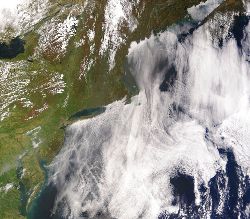 Students who take the Climatology concentration will study the past, present, and future of Earth’s atmospheric system that, in interaction with the land and the hydrosphere, generate long-term weather patterns that is climate. Methods for investigating paleoclimates such as dendrochronology, ice and sediment cores, will be emphasized along with use of Atmospheric-Oceanic General Circulation Models for the investigation of future climate change.
Students who take the Climatology concentration will study the past, present, and future of Earth’s atmospheric system that, in interaction with the land and the hydrosphere, generate long-term weather patterns that is climate. Methods for investigating paleoclimates such as dendrochronology, ice and sediment cores, will be emphasized along with use of Atmospheric-Oceanic General Circulation Models for the investigation of future climate change.
- Earth and Environmental Processes Concentration
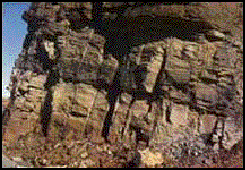 Students who select this concentration combine elements of the modern, process-oriented geology curriculum (sedimentology, geomorphology, petrology, basin analysis, seismology, potential-field geophysics, organic and water geochemistry, tectonics, and paleo-environmental analysis) with allied disciplines to prepare for research into a broad range of environmental studies. This concentration emphasizes the geological process approach to analysis of such problems as flooding, earthquake hazards, land-use practices, aquifer degradation, and mine site remediation.
Students who select this concentration combine elements of the modern, process-oriented geology curriculum (sedimentology, geomorphology, petrology, basin analysis, seismology, potential-field geophysics, organic and water geochemistry, tectonics, and paleo-environmental analysis) with allied disciplines to prepare for research into a broad range of environmental studies. This concentration emphasizes the geological process approach to analysis of such problems as flooding, earthquake hazards, land-use practices, aquifer degradation, and mine site remediation.
- Ecology Concentration
 Students who take the ecology concentration will work with faculty from the Center for Ecology. Ecology studies the complex relationships between organisms, populations, communities, ecosystems, biomes and the biosphere, which are deeply affected by human decisions, actions and policies - acions and policies which are themselves influenced by the environment. Environmental Resources and Policy-ecology students will focus on the ecosystem-society relationship, such as the provision and management of ecosystem services. As the human footprint widens, and active management of ecosystems becomes more policy-relevant, understanding these connections is a vital component of training the next generation of scientists.
Students who take the ecology concentration will work with faculty from the Center for Ecology. Ecology studies the complex relationships between organisms, populations, communities, ecosystems, biomes and the biosphere, which are deeply affected by human decisions, actions and policies - acions and policies which are themselves influenced by the environment. Environmental Resources and Policy-ecology students will focus on the ecosystem-society relationship, such as the provision and management of ecosystem services. As the human footprint widens, and active management of ecosystems becomes more policy-relevant, understanding these connections is a vital component of training the next generation of scientists.
- Energy and Mineral Resources Concentration
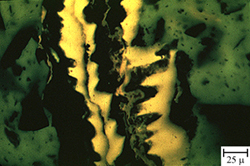
Energy and mineral resources include hydrocarbons (oil, natural gas, coal, and their naturally-occurring and manufactured derivatives), and both metallic and non-metallic (industrial) mineral and rock deposits. This concentration comprises studies of the origins and physical occurrences of these resources, together with technologies and policies concerning their extraction and use.
- Environmental Policy and Administration Concentration
 Making and administering environmental policy has become an exceedingly complex arena where science interacts strongly with law and the political process. Students enrolled in this concentration will examine these interactions and complexities with a focus on the socioeconomic driving forces that generate resource use and attendant environmental problems, and the political and legal frameworks through which societies make and implement public policy in the environmental field.
Making and administering environmental policy has become an exceedingly complex arena where science interacts strongly with law and the political process. Students enrolled in this concentration will examine these interactions and complexities with a focus on the socioeconomic driving forces that generate resource use and attendant environmental problems, and the political and legal frameworks through which societies make and implement public policy in the environmental field.
- Forestry, Agricultural, and Rural Land Resources Concentration
 Many environmental problems, challenges and policies take place on rural landscapes where forestry and agricultural land uses are intermingled with non-farm rural residents and others. Many rural land uses contribute to environmental problems and the development of environmentally benign and sustainable methods of production are goals of environmental policy. Consequently, through this concentration, students will examine the interaction among environmental quality, production, and the process and institutions of public policy.
Many environmental problems, challenges and policies take place on rural landscapes where forestry and agricultural land uses are intermingled with non-farm rural residents and others. Many rural land uses contribute to environmental problems and the development of environmentally benign and sustainable methods of production are goals of environmental policy. Consequently, through this concentration, students will examine the interaction among environmental quality, production, and the process and institutions of public policy.
- Geographic Information Systems and Environmental Modeling Concentration
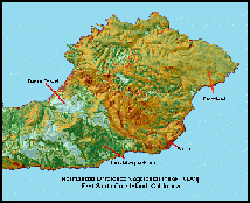 Modern environmental sciences, management and planning rely on acquisition, analysis and integration of large data bases using remote sensing, digital image processing, geographic information systems and environmental modeling. The purpose of this concentration is to enable students to develop high skills in these areas and to apply them to one or more natural resource domains (e.g., hydrogeology, forest inventory, spatial decision support systems, environmental modeling).
Modern environmental sciences, management and planning rely on acquisition, analysis and integration of large data bases using remote sensing, digital image processing, geographic information systems and environmental modeling. The purpose of this concentration is to enable students to develop high skills in these areas and to apply them to one or more natural resource domains (e.g., hydrogeology, forest inventory, spatial decision support systems, environmental modeling).
- Water Resources Concentration
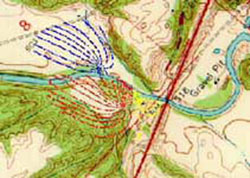 As a critical flow resource, water is of central importance to society and, through hydrologic processes, is involved in many environmental issues from water shortages in populous arid regions to ground water quality concerns associated with agri-chemical use. Through this concentration, students will examine the interaction among hydrologic processes, environmental quality, water resource use, and the processes and institutions of the private sector and public policy that govern water resources.
As a critical flow resource, water is of central importance to society and, through hydrologic processes, is involved in many environmental issues from water shortages in populous arid regions to ground water quality concerns associated with agri-chemical use. Through this concentration, students will examine the interaction among hydrologic processes, environmental quality, water resource use, and the processes and institutions of the private sector and public policy that govern water resources.
![]() Check out the program courses and specialized curriculum for each concentration to help you outline what courses you should take.
Check out the program courses and specialized curriculum for each concentration to help you outline what courses you should take.




 Students who take the Climatology concentration will study the past, present, and future of Earth’s atmospheric system that, in interaction with the land and the hydrosphere, generate long-term weather patterns that is climate. Methods for investigating paleoclimates such as dendrochronology, ice and sediment cores, will be emphasized along with use of Atmospheric-Oceanic General Circulation Models for the investigation of future climate change.
Students who take the Climatology concentration will study the past, present, and future of Earth’s atmospheric system that, in interaction with the land and the hydrosphere, generate long-term weather patterns that is climate. Methods for investigating paleoclimates such as dendrochronology, ice and sediment cores, will be emphasized along with use of Atmospheric-Oceanic General Circulation Models for the investigation of future climate change. Students who select this concentration combine elements of the modern, process-oriented geology curriculum (sedimentology, geomorphology, petrology, basin analysis, seismology, potential-field geophysics, organic and water geochemistry, tectonics, and paleo-environmental analysis) with allied disciplines to prepare for research into a broad range of environmental studies. This concentration emphasizes the geological process approach to analysis of such problems as flooding, earthquake hazards, land-use practices, aquifer degradation, and mine site remediation.
Students who select this concentration combine elements of the modern, process-oriented geology curriculum (sedimentology, geomorphology, petrology, basin analysis, seismology, potential-field geophysics, organic and water geochemistry, tectonics, and paleo-environmental analysis) with allied disciplines to prepare for research into a broad range of environmental studies. This concentration emphasizes the geological process approach to analysis of such problems as flooding, earthquake hazards, land-use practices, aquifer degradation, and mine site remediation. Students who take the ecology concentration will work with faculty from the Center for Ecology. Ecology studies the complex relationships between organisms, populations, communities, ecosystems, biomes and the biosphere, which are deeply affected by human decisions, actions and policies - acions and policies which are themselves influenced by the environment. Environmental Resources and Policy-ecology students will focus on the ecosystem-society relationship, such as the provision and management of ecosystem services. As the human footprint widens, and active management of ecosystems becomes more policy-relevant, understanding these connections is a vital component of training the next generation of scientists.
Students who take the ecology concentration will work with faculty from the Center for Ecology. Ecology studies the complex relationships between organisms, populations, communities, ecosystems, biomes and the biosphere, which are deeply affected by human decisions, actions and policies - acions and policies which are themselves influenced by the environment. Environmental Resources and Policy-ecology students will focus on the ecosystem-society relationship, such as the provision and management of ecosystem services. As the human footprint widens, and active management of ecosystems becomes more policy-relevant, understanding these connections is a vital component of training the next generation of scientists. Energy and mineral resources include hydrocarbons (oil, natural gas, coal, and their naturally-occurring and manufactured derivatives), and both metallic and non-metallic (industrial) mineral and rock deposits. This concentration comprises studies of the origins and physical occurrences of these resources, together with technologies and policies concerning their extraction and use.
Energy and mineral resources include hydrocarbons (oil, natural gas, coal, and their naturally-occurring and manufactured derivatives), and both metallic and non-metallic (industrial) mineral and rock deposits. This concentration comprises studies of the origins and physical occurrences of these resources, together with technologies and policies concerning their extraction and use.
 Making and administering environmental policy has become an exceedingly complex arena where science interacts strongly with law and the political process. Students enrolled in this concentration will examine these interactions and complexities with a focus on the socioeconomic driving forces that generate resource use and attendant environmental problems, and the political and legal frameworks through which societies make and implement public policy in the environmental field.
Making and administering environmental policy has become an exceedingly complex arena where science interacts strongly with law and the political process. Students enrolled in this concentration will examine these interactions and complexities with a focus on the socioeconomic driving forces that generate resource use and attendant environmental problems, and the political and legal frameworks through which societies make and implement public policy in the environmental field. Many environmental problems, challenges and policies take place on rural landscapes where forestry and agricultural land uses are intermingled with non-farm rural residents and others. Many rural land uses contribute to environmental problems and the development of environmentally benign and sustainable methods of production are goals of environmental policy. Consequently, through this concentration, students will examine the interaction among environmental quality, production, and the process and institutions of public policy.
Many environmental problems, challenges and policies take place on rural landscapes where forestry and agricultural land uses are intermingled with non-farm rural residents and others. Many rural land uses contribute to environmental problems and the development of environmentally benign and sustainable methods of production are goals of environmental policy. Consequently, through this concentration, students will examine the interaction among environmental quality, production, and the process and institutions of public policy. Modern environmental sciences, management and planning rely on acquisition, analysis and integration of large data bases using remote sensing, digital image processing, geographic information systems and environmental modeling. The purpose of this concentration is to enable students to develop high skills in these areas and to apply them to one or more natural resource domains (e.g., hydrogeology, forest inventory, spatial decision support systems, environmental modeling).
Modern environmental sciences, management and planning rely on acquisition, analysis and integration of large data bases using remote sensing, digital image processing, geographic information systems and environmental modeling. The purpose of this concentration is to enable students to develop high skills in these areas and to apply them to one or more natural resource domains (e.g., hydrogeology, forest inventory, spatial decision support systems, environmental modeling). As a critical flow resource, water is of central importance to society and, through hydrologic processes, is involved in many environmental issues from water shortages in populous arid regions to ground water quality concerns associated with agri-chemical use. Through this concentration, students will examine the interaction among hydrologic processes, environmental quality, water resource use, and the processes and institutions of the private sector and public policy that govern water resources.
As a critical flow resource, water is of central importance to society and, through hydrologic processes, is involved in many environmental issues from water shortages in populous arid regions to ground water quality concerns associated with agri-chemical use. Through this concentration, students will examine the interaction among hydrologic processes, environmental quality, water resource use, and the processes and institutions of the private sector and public policy that govern water resources.